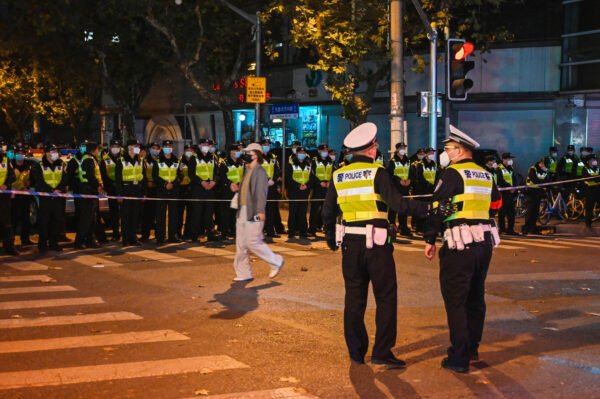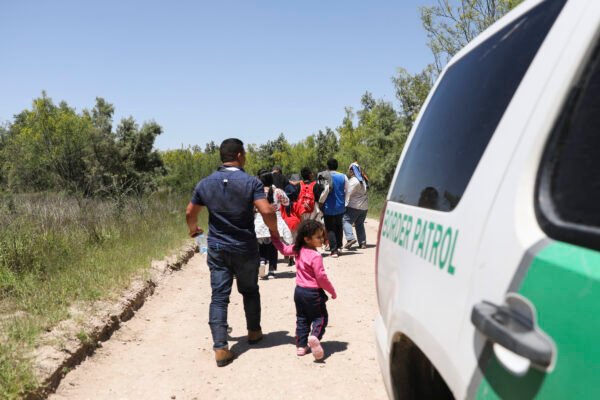The lockdown of Shanghai, China’s largest city, in March 2022 prompted the emergence of “润,” pronounced run, as Chinese try to emigrate. In January, U.S. Customs and Border Protection announced a tenfold increase in the number of Chinese people crossing the southern border, raising national security concerns.
In January alone, 1,084 Chinese nationals were apprehended at the southern U.S. border, compared with 89 in January 2022, representing a 1,118 percent increase, according to U.S. Customs and Border Protection.
In addition, Border Patrol agents at the U.S. southern border arrested 2,999 Chinese nationals in the four-month period from October 2022 to January 2023, a 719 percent increase from 366 in the same period in 2022, and more than the 2,626 arrested in fiscal years 2021 and 2022 combined.
Why the surge in Chinese smuggling across the United States’ southern border?
This is just one small stream in the wave of migration that has erupted in China in recent years.
CCP’s Zero-COVID Policy Boosts ‘Run’ Trend
In May 2022, the Chinese character “润” appeared frequently on Chinese social media.
The Chinese word “润,” while sounding like the English word “run,” on Chinese social media means to run away and emigrate overseas.
Beginning in March 2022, authorities in Shanghai, a city with many business, cultural, and academic elite, began to lock the city down and separate children from parents infected with COVID-19, sparking public discontent. Residents who criticized the authorities online were approached by police.
Captivity and authoritarianism have caused a surge in Chinese people’s desire for immigration and an increase in online discussions about the topic.

“A lot of clients I know in Shanghai have already run. Those who have the means to run, either themselves or their children, have done so,” said a netizen “Hong Buming.”
Chen Chuanchuang, a Chinese lawyer who escaped to New York in 2012, said that although the Chinese Communist Party (CCP) has been tyrannical for decades, it is still rare to see almost everyone being held as prisoners as they have been for the past three years.
“For example, when there were serious conflicts between urban and rural areas, the 20 percent urban population still had a much better [life] than the other 80 percent rural population,” Chen told The Epoch Times on Feb. 16.
“But this time, whether you are in the city, in the countryside, in Beijing, in Shanghai, everywhere, we see the authorities locking people in their homes like prisoners. So for the average people, such personal experience is more unforgettable to them.”
According to the “WeChat Index” provided by Chinese social media WeChat, on April 3, 2022, after the CCP’s official announcement to “strictly adhere to the ‘Zero-COVID policy,” the overall search index for “immigrants” increased by 440 percent on that day.
According to the migration keyword search data released by Baidu for the week from March 28–April 3, 2022, the number of searches about “conditions for emigrating to Canada” surged to the peak, up 2,846 percent from the previous month. This was followed by a 2,455 percent month-on-month increase in the number of searches for “good places to go abroad.”
At the 20th CCP Congress, Xi Jinping successfully kicked off his third term, prompting more Chinese to consider running.

David Lesperance, a European lawyer who worked with wealthy families in Hong Kong and China, told the Financial Times that he had received three instructions from Chinese ultra-high-net-worth business families to carry out their “fire escape plans.” Many of his clients spent years planning their escape, moving money legally to safe offshore jurisdictions and arranging overseas homes and new citizenship for their families.
About 10,800 wealthy Chinese emigrated in 2022, the most since 2019, according to New World Wealth, a global data intelligence partner of investment immigration consultancy Henley & Partners.
One Smuggling Case Triggers Demonstration Effect
There are many ways for the rich to immigrate, but how can the poor escape China?
A CNN report in August 2022 caught many people’s attention.
The story describes how Wang Qun, a 33-year-old Chinese man, left his family behind and traveled thousands of miles by plane, bus, boat, and motorcycle through dense jungles and barren mountains, into and out of detention centers, and finally across the southern U.S. border.
Another young Chinese, Liu Xiang, saw the report. It made the road map of China in his mind instantly clear.
Liu has long wanted to go abroad.
Liu was born in Xinjiang in 1985. This was the source of many of the horrors in his life.
After graduating from college, Liu stayed in Xinjiang to work. Once walking on the street, he was stopped by the police for no reason.
“In the activity of checking phones on the street, [the police] checked my phone and found that there were some apps in my phone which were not approved by the Xinjiang government and considered to be relatively sensitive,” Liu told The Epoch Times on Feb. 17.
“He told me that I could be sent to a re-education camp for such behaviour, but since he didn’t find many ‘illegal’ records of mine, he let me off. Yet he said if he finds anything like that again, he will send me in.”

After this horrific experience, Liu left Xinjiang to work in Beijing and managed to change his hukou (China’s household registration system) from Xinjiang to Shenzhen. However, the CCP’s surveillance system has been following him like a ghost.
“Since I was born in Xinjiang, my hukou, my ID card number starts with 65, whenever I stay in a hotel or take public transport like trains anywhere in the country, the police will stop me. Because I was born there and my hukou was there, they will put me in another category. When I stay in a hotel, the police will come to check on me, asking me what I am doing, how many days I am staying, and my contacts … everything.”
Since 2020, Liu had been thinking about leaving China.
On Sept. 24, 2022, Liu saw CNN’s report on Wang Qun. For the first time, he knew of such a route smuggling into the United States.
On Sept. 25, Liu’s application for a passport was rejected. The reason given by the authorities is “non-essential international travel.” Inspired by netizens, Liu applied for a passport again on Sept. 30 under the pretext of “taking an IELTS test in Macao,” referring to the International English Language Testing System. On Oct. 14, Liu got his passport.
On Oct. 27, Liu went to the U.S. consulate to apply for a tourist visa but was denied. So far, Liu made up his mind to follow the same route to the United States as Wang.
1,600 Miles Across Mexico on Motorcycle
Liu entered Macau from Zhuhai on Nov. 1. He then flew to Thailand from Macau via Taipei, from Thailand to Seoul, from Seoul to Panama City, and then smuggled into Costa Rica, all the way through Nicaragua, Honduras, Guatemala, and then into Mexico. After that, he took 14 days on a motorcycle to travel 1,600 miles from south to north through Mexico to the border with the United States in California.

Liu lived in fear and hardship along the way.
“Every day there might be [Mexican] immigration checks, and then there were gangs, and even some dirty cops,” he said. “All these people came in and tried to rob us of all our money, but we had to leave some money for the next gang. If we didn’t have any money, he would send us back to the immigration jail, so we walked very carefully every day. When we saw a checkpoint from a distance, we tried to avoid it.”
Despite the hardships along the way, Liu did not care because there was a goal in mind.
Liu declined to say much about the specific process of entering the United States, saying that at that time, he was finally relieved.
“I felt like I was finally free of those fears and able to stand up and move forward with dignity.”
Along the way, Liu encountered about 50 Chinese who were trying to sneak across the southern border into the United States.
Surge in Chinese Smuggling Raises Concerns
Victor Avila, a former Immigration and Customs Enforcement (ICE) agent and border security expert, told Texas Scorecard that according to his source, thousands of Chinese nationals were rushing to the border from South America.
The number of Chinese smuggling across the southern border into the United States has soared, sparking concern in Washington.
In the past two years, the influx of illegal immigrants at the southern border of the United States has skyrocketed, reaching 1,734,686 in 2021, up 278 percent from 458,088 in 2020. The number of illegal immigrants crossing the southern border in 2022 reached 2,378,944, a 419 percent increase over 2020.
This is a “perfect opportunity” for the CCP’s security services to place their personnel in the United States, Gordon Chang, a U.S.-based China expert, told Fox.
“Our southern border is undefended and there are bad actors coming in,” he said. “We need to get control of the situation.“
Victor Avila, a retired ICE agent, agrees that stowaways pose a serious security threat because CCP spies are likely hiding among them.
“This is a national security issue … because we know who China is,” Avila said. “They’re our biggest adversary.”
Such concerns are justified, as the CCP’s influence is spreading across Latin America and the Caribbean, with two-way trade soaring from $18 billion in 2002 to nearly $316 billion in 2019. China is the largest trading partner of Brazil, Chile, Peru, and Uruguay. The CCP has free trade agreements with Chile, Costa Rica, and Peru. In addition, 19 countries in the Western Hemisphere have expressed willingness to participate in the CCP’s Belt and Road Initiative, and Beijing has set up about 45 Confucius Institutes in the region.
For the CCP, it has to penetrate every avenue, Chen said.
“They certainly haven’t given up other means of coming in under legal cover, but smuggling has one ‘advantage’ over legal visas,” he said.
“No matter what kind of visa you apply for, you always have to submit personal information about yourself. Your family background, your working environment, all of that have to be verified by the U.S. Embassy. But if you are smuggled in, there is no way to verify it. You are what you say you are.”